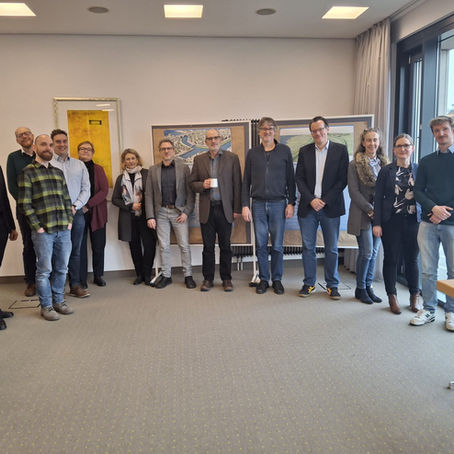
Paths to improved risk management in the area of marine extreme events and natural hazards
In the research mission of the Deutsche Allianz Meeresforschung (DAM) “Paths to improved risk management in the area of marine extreme events and natural hazards”, short title mareXtreme, around 150 scientists from 29 partner organizations are researching how to deal with the interactions between short-term multiple and cascading extreme events and natural hazards and their long-term effects on marine ecosystems and social life on the coast. The four joint projects ElbeXtreme, METAscales, MULTI-MAREX and PrimePrevention are investigating georisks as well as biological and oceanographic-meteorological risks.
The aim of mareXtreme is to significantly improve the ability to predict marine extreme events and natural hazards, to support the sustainable development of coastal communities and to strengthen the resilience of coastal societies.
Duration: 01.01.2024 - 31.12.2026 (Phase 1)

mareXtreme is a research mission focused on studying and managing extreme marine events and natural hazards. These events, which include geohazards, floods, droughts, heatwaves and storm surges, pose significant risks to coastal ecosystems and human communities. In the context of a transdisciplinary, participatory research approach, real-world laboratories will be set up to implement dialogue and collaboration with the various stakeholders.
Marine extreme events and natural hazards primarily impact on local and regional scales and often trigger cascades of complex, non-linear processes (e.g. tsunamis as a result of earthquakes). Examples include earthquakes or tsunamis in the Mediterranean Sea or marine heatwaves, algal blooms and subsequent local oxygen depletion in the Baltic Sea (and other seas). These processes require comprehensive observation approaches and adaptation strategies, including early warning systems (EWS) and stakeholder involvement, to prepare for the impacts of such events and increase the resilience of coastal communities. Achieving this requires improving observation capacities, cross-scale hazard modelling and a comprehensive understanding of the complex behaviour of the systems, their trajectories and possible tipping points, which can only be achieved through intensive collaboration with the various stakeholders, including government agencies and industry.
In phase 1 (2024-2026), mareXtreme's focus is on marine natural hazards in the Aegean Sea, as such events affect both German holidaymakers locally and have an impact on the European economic area. We are investigating these processes with our Greek partner institutions (MULTI-MAREX). At the same time, we are also concentrating on the North and Baltic Seas ( ElbeXtreme , METAscales and PrimePrevention ). Here we are concerned with topics and focal points that play a role in our coastal waters, such as storm surges and extreme water levels coupled with flooding risks or biological marine extremes as a result of water temperatures and nutrient loads.
CROSS-CUTTING TOPICS
What distinguishes mareXtreme from other research missions are our three integrative mission-defining Cross-Cutting Topics (CCTs), which act as a bridge between the projects. These cross-cutting topics achieve unique synthesis achievements that lead to new scientific insights and shape mission-oriented research. So far, we have identified three cross-cutting topics, which are briefly outlined below:
Joint projects
Mission spokespersons
Project Partner (alphabetical order)
-
AG Küstengeologie und Sedimentologie, Christian-Albrechts-Universität zu Kiel
-
Albert-Ludwigs-Universität Freiburg
-
Alfred-Wegener-Institut Helmholtz Zentrum für Polar- und Meeresforschung
-
AquaEcology GmbH & Co. KG
-
Arbeitsgruppe Geomorphologie und Geochronologie, Universität zu Köln
-
Archeoinformatics - Data Science, Christian-Albrechts-Universität zu Kiel
-
Biome-id, Wilhelmshaven
-
Bundesamt für Seeschifffahrt und Hydrographie (BSH)
-
Bundesanstalt Technisches Hilfswerk (THW)
-
Bund für Umwelt- und Naturschutz Deutschland, Landesverband Bremen e.V.
-
Deutsches Zentrum für Luft- und Raumfahrt
-
Fakultät für Biologie, Universität Freiburg
-
Fakultät für Georessourcen und Materialtechnik, Rheinisch-Westfälische Technische Hochschule Aachen (RWTH)
-
Forschungszentrum Küste, Leibniz Universität Hannover
-
Geographisches Institut, Christian-Albrechts-Universität zu Kiel
-
Helmholtz-Zentrum für Ozeanforschung Kiel (GEOMAR)
-
Helmholtz-Zentrum für Umweltforschung (UFZ)
-
Helmholtz-Zentrum hereon GmbH
-
Helmholtz-Zentrum Potsdam Deutsches GeoForschungsZentrum (GFZ)
-
Integrative Geographie, Universität Hamburg
-
Institut für Geographie und Geologie, Julius-Maximilians-Universität Würzburg
-
Institut für Geophysik, Universität Hamburg
-
Institut für Meereskunde, Klimamodellierung, Universität Hamburg
-
Institut für Mikrosystemtechnik, Universität Freiburg
-
Institut für Ostseefischerei, Johann Heinrich von Thünen-Institut Bundesforschungsinstitut für Ländliche Räume, Wald und Fischerei
-
Institut für Raumordnung und Entwicklungsplanung, Universität Stuttgart
-
Jade Hochschule Wilhelmshaven/Oldenburg/Elsfleth
-
Kieler Forschungswerkstatt, Christian-Albrechts-Universität zu Kiel
-
Leibniz-Institut für Ostseeforschung Warnemünde (IOW)
-
Leichtweiß-Institut, Technische Universität Carolo-Wilhelmina zu Braunschweig
-
Ludwig-Franzius-Institut, Gottfried Wilhelm Leibniz Universität Hannover
-
Marine Geophysik und Hydroakustik, Christian-Albrechts-Universität zu Kiel
-
Marine Sensorsysteme, Carl von Ossietzky Universität Oldenburg
-
Niedersächsischer Landesbetrieb für Wasserwirtschaft, Küsten- und Naturschutz
-
Sea & Sun Technology GmbH (KMU)
-
s.Pro sustainable projects GmbH (KMU)
-
Technische Universität Hamburg
-
United Nations University (UNU-EHS)
-
Universität Bremen MARUM
-
Universität Rostock




















